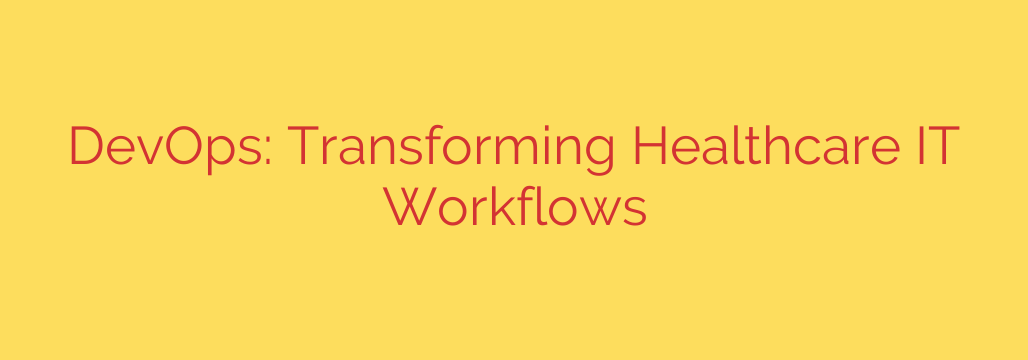
The Power of DevOps in Healthcare: Enhancing Speed, Security, and Patient Care
The healthcare industry operates under immense pressure. On one hand, there’s a constant demand for innovation—better electronic health records (EHR), more intuitive telemedicine platforms, and seamless patient portals. On the other, the stakes could not be higher, with patient safety and sensitive data protection governed by strict regulations like HIPAA and HITECH. For years, this has created a culture of slow, cautious IT development. But a new approach is changing the game.
DevOps, a framework that merges software development (Dev) and IT operations (Ops), is breaking down old barriers and enabling healthcare organizations to innovate safely and rapidly. By fostering collaboration and leveraging automation, DevOps is not just an IT strategy; it’s a catalyst for better patient outcomes.
The Core Challenges of Traditional Healthcare IT
Historically, healthcare IT has been defined by siloed teams and manual processes. Developers would write code and “throw it over the wall” to the operations team for deployment. This created several critical problems:
- Slow Development Cycles: Lengthy, manual testing and approval processes meant that even minor updates to software could take months to go live.
- High Risk of Errors: Manual deployments are prone to human error, which can lead to system downtime—a critical risk when dealing with hospital information systems or patient records.
- Security as an Afterthought: Security checks were often performed at the very end of the development cycle, making vulnerabilities difficult and expensive to fix.
- Compliance Hurdles: Manually documenting and proving compliance with regulations like HIPAA was a cumbersome and inefficient process.
These challenges have made it difficult for healthcare providers to keep pace with technological advancements and patient expectations.
How DevOps Provides the Solution
DevOps introduces a cultural and procedural shift that directly addresses these issues. The goal is to create a seamless, automated pipeline from code development to deployment, built on a foundation of communication and shared responsibility.
The key principles include:
- Collaboration: Breaking down the walls between development, operations, and security teams to ensure everyone is working toward the same goals from the beginning.
- Automation: Automating repetitive tasks like testing, security scans, compliance checks, and infrastructure deployment. This is the engine of DevOps.
- Continuous Integration/Continuous Delivery (CI/CD): A core practice where developers regularly merge their code changes into a central repository, after which automated builds and tests are run. This allows for smaller, more frequent, and safer releases.
The Tangible Benefits of DevOps in a Healthcare Setting
When applied correctly, DevOps delivers powerful results that go far beyond the IT department.
1. Accelerated Delivery of Critical Tools
In a rapidly evolving field, speed matters. Whether it’s updating a telemedicine app to handle more patients or adding a new feature to an EHR system, DevOps makes it possible to deliver value faster. By automating the build, test, and deployment process, organizations can reduce release cycles from months to weeks, or even days. This agility allows providers to respond quickly to the needs of both clinicians and patients.
2. Dramatically Enhanced Security and Compliance (DevSecOps)
In healthcare, security cannot be optional. This has led to the rise of DevSecOps, which integrates security practices directly into the DevOps pipeline. Instead of a final security check, security is a shared responsibility, “baked in” from the start.
Actionable security tips include:
- Automated Security Scans: Integrate tools that automatically scan code for vulnerabilities every time a change is made.
- Infrastructure as Code (IaC): Define and manage your IT infrastructure through code, ensuring configurations are consistent, secure, and fully documented for audits.
- Continuous Compliance: Automate compliance checks against HIPAA and other regulatory standards within your deployment pipeline. This provides a real-time audit trail and ensures you are always compliant.
3. Increased System Stability and Reliability
Downtime in healthcare is not just an inconvenience; it can directly impact patient care. The automation inherent in DevOps significantly reduces the risk of human error during software releases. With automated testing and phased rollouts, problems can be caught and fixed before they affect critical systems. This leads to more stable and reliable applications that clinicians can depend on.
4. Ultimately, Improved Patient Care
This is the most important benefit. When doctors and nurses have access to better, more reliable, and feature-rich software, they can do their jobs more effectively. Faster updates to a patient portal can improve patient engagement, while a more stable EHR system ensures seamless access to critical information. By improving the underlying technology, DevOps indirectly but powerfully contributes to a higher standard of patient care.
Getting Started with DevOps in Your Healthcare Organization
Adopting DevOps is a journey, not a destination. It requires a strategic approach focused on both culture and technology.
- Foster a Collaborative Culture: The most important step is to encourage communication and shared ownership between teams. Break down the “us vs. them” mentality.
- Start Small with a Pilot Project: Don’t try to transform the entire organization overnight. Select a single, low-risk application or service to use as a pilot project to demonstrate value and learn key lessons.
- Invest in the Right Tools: Select and implement a toolchain for CI/CD, automated testing, security scanning, and infrastructure automation that fits your organization’s specific needs.
- Prioritize Security from Day One: Embrace the DevSecOps mindset. Involve your security team early and make security a non-negotiable part of the automated pipeline.
For modern healthcare organizations, embracing DevOps is no longer a choice—it’s a strategic imperative for staying competitive, secure, and focused on what truly matters: delivering exceptional patient care.
Source: https://collabnix.com/how-devops-is-reinventing-workflows-in-healthcare-it/








